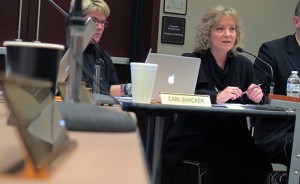Teacher Licensing Rules Hang In The Balance, Causing Controversy

Kyle Stokes / StateImpact Indiana
Ritz is one of the board members who voted against the REPA III changes at a board meeting earlier this month.
Earlier this month, the State Board of Education approved the final pieces of a new set of teacher certification requirements.
In addition to requiring increased levels of education for principals and superintendents, the board approved the requirements around a new teacher certification called a career specialist (previously known as the adjunct permit).
The requirements to get a career specialist license are:
- Bachelor’s degree in a related field
- 6,000 hours of professional experience in a related field
- 3.0 GPA
- Pass a content test
- Begin a teacher training program within first month of starting a teaching job
- Will REPA III Create Inexperienced Teachers?The proposed new requirements to receive a “career specialist” license to teach are being criticized by many as too loose. StateImpact Indiana’s Claire McInerny reports on the main arguments against REPA III. Download
Many have spoken out against the career specialist permit in REPA III, the set of requirements for teacher licensing in the state.
A stale lecture or a teacher who might be very smart, but has no idea how to engage his or her students in the material is at the center of the criticism swirling around the permit.
Who are these potential “career specialists”?
Jacqulyn Fleming is a good example of what a career specialist looks like. Fleming got her bachelor’s degree in math, and has spent the last few years teaching remedial math classes at Ivy Tech Community College.
Under the new requirements she qualifies for a career specialist license with her degree and experience at Ivy Tech. But despite Fleming’s extensive knowledge of math, many disagree that content knowledge alone is not enough to be an effective teacher.
“That speaks volumes, in my mind, as to the value truly being placed on what I believe is truly the most important profession in our country,” said Jill Shedd, Assistant Dean for Teacher Education at Indiana University’s School of Education.
One of her criticisms is the component of REPA III that requires a career specialist to complete a pedagogy program during their first year of teaching to learn effective teaching strategies. Shedd fears that sets teachers up for failure during their first year.
“So all those responsibilities in managing their exceptional needs students understanding all the testing and the diagnostic testing that might be going on, working with parents, having responsibilities as a member of a department, and they are doing that from day one, with no experience in a classroom,” said Shedd.
REPA III, a continuance of the REPA II debate
This argument has been waging in Indiana for a while. The adjunct license that had similar requirements to the new career specialist one was included in the previous version of REPA III, REPA II, which former state superintendent Tony Bennett introduced in 2012.
When Glenda Ritz took office though, she decided to overhaul it.
The State Board’s attorney, Michelle McKeown, says this time the board included public hearings and public comments to address concerns in the first version.
“We received about 1,000 comments, I personally read all of those comments,” McKeown said.
And those comments shaped the new version of the requirements.
“Since then, they’ve been making policy decisions about the things that we’ve received comments on,” McKeown said.
Including requiring a master’s degree for principals and an education specialist degree for superintendents, two major criticisms of REPA II when those degrees were not required..
Will better teacher preparation mean better teachers?
All of these concerns come down to the question of proper teacher preparation, and how much is enough.
Fleming finds this question to be tough. She just completed IU’s transition to teaching program, housed in the School of Education, so she can teach secondary math. She met the requirements for a teaching license before enrolling in the program. So how did it benefit her?
“Things that I didn’t know at all, that are really common in education,” which Fleming says included learning theories, behaviorism, cognitive theory and how to teach to students with different learning challenges.
And now she’s looking for jobs, but still doesn’t know if she’s ready. Not because she doesn’t have the content and teaching knowledge, but because teaching she says is a really hard job.
“Even if you go through the education program, you take the education classes it doesn’t mean you’re going to be a good teacher, it doesn’t mean you’re going to use those strategies that you learned,” Fleming said. “You could still teach your class in a really traditional, boring way.”
Shedd argues that giving a potential teacher as many resources as possible is necessary, whether they use those skills are not.
“At a time when we are asking so much of teachers and have high expectations for teachers in classrooms, it just doesn’t seem consistent or make sense that they are lowering standards for teachers,” said Shedd.
The license is only one avenue a potential teacher can pursue to get licensed and principals and superintendents have the option of hiring someone without the career specialist licensing.
The State Board of Education will vote to finalize the requirements at its June meeting.